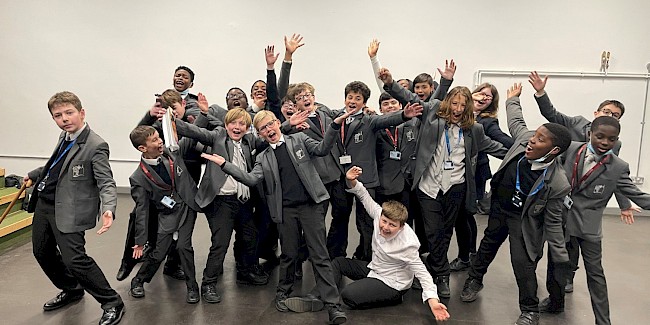GCSE Drama
Edexcel Drama GCSE gives students the opportunity to create their own work, perform scripted plays and study live performances. Throughout the course students continue to develop their acting skills, including the use of; voice, physicality, characterisation and improvisation. Lessons are very practical and involve a great deal of collaborative work. The course is very flexible and offers options for not only actors, but also those wishing to explore design elements, including lighting, sound, and costume. Alongside these practical skills we also undertake the study and analysis of play texts to experience how a production team of actors, designers, technicians and directors might transfer a play from the page to stage. Students will attend live theatrical performances to support them in both the performance and written aspects of the course.
Course Components
Component 1: Devising – 40% - 60 marks. Students create their own devised performance based on one of a range of stimuli. In addition to the performance, students will be marked on an accompanying portfolio with evidence of the process and decisions made whilst creating and developing their performance.
Component 2: Performance from Text – 20% - 48 marks. Students take part in a live scripted performance which includes two extracts from the same play. Students will also be required to produce a short accompanying document which outlines their intentions for and approach to the performance.
Component 3: Theatre Makers in Practice – 40% - 60 marks. This requires students to study one performance text in detail from a set list given by the exam board. In Section B, students will be required to analyse and evaluate a live theatre performance they have seen using accurate subject-specific terminology.
Year 10
| Term 1 | Term 2 | Term 3 | Term 4 | Term 5 | Term 6 |
|---|
| Component 1: Responding to a stimulus & Portfolio | Component 1: continued & Component 3: Live Theatre Review | Component 1: Devised Performance & Portfolio | Component 3: DNA Exam Technique | Component 3: Exploring technical theatre | Component 2: Performance from Text |
Year 11
| Term 1 | Term 2 | Term 3 | Term 4 | Term 5 | Term 6 |
|---|
| Component 2: Performance from Text | Component 2: continued & Component 3: Exam technique & Live Theatre Review | Component 2: Performance from Text Exam | Component 3: Exam technique & revision | Component 3: Exam technique & revision | GCSEs |
Assessment GCSE
| | Component 1: Devising | Component 2: Performance from Text | Component 3: Writte Exam - 1hr 45mins |
|---|
| Overall Percentage and Marks | 40%
60 Marks | 20%
48 Marks | 40%
60 Marks |
| Breakdown | - Portfolio - 45 Marks
- Performance - 15 Marks
- Internally assessed
| - Group Performance of two extracts – 24 Marks each
- Externally assessed
| - A: Bringing Texts to Life (DNA) – 45 Marks
- B: Live Theatre Evaluation – 15 Marks
|
